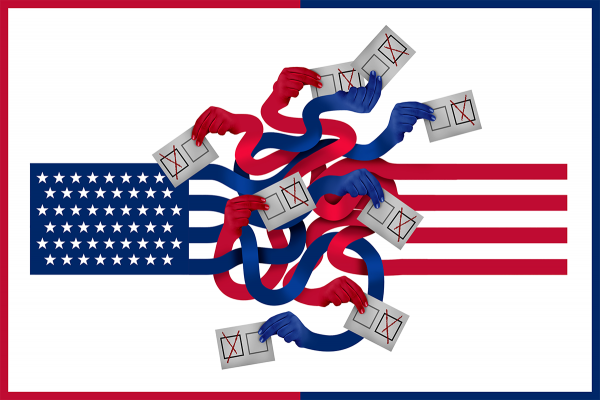JUST AS FOR 50 years Ohio was a bellwether for presidential elections, since 2011 North Carolina has become a testing ground for Far Right legislation aimed at controlling federal election administration. In his book Indecent Assembly, author Gene R. Nichol says North Carolina is now “a laboratory for extremism.”
In September, the Supreme Court included on its docket a Republican-backed case out of North Carolina that pits voters against a state legislature that seeks to greatly increase its power over elections by limiting the ability of the state judiciary to review the actions of the legislature. This could potentially unbalance the fundamental checks and balances essential to a functioning democracy by giving one body total control over a function of government.
While the specific case of Moore v. Harper deals with whether the North Carolina state Supreme Court has the power to strike down state legislation that produced illegally gerrymandered voting districts, the federal Supreme Court will deliberate on whether the U.S. Constitution’s election clause, the primary source of constitutional authority to regulate elections, prevents a state judiciary from ordering a state legislature to comply with federal election laws.
The North Carolina state legislature has built its legal argument on the radical “independent state legislature” theory that posits a state legislature can act independently from judicial oversight. Former federal judge J. Michael Luttig, appointed by George W. Bush, has been tracking the Republican blueprint for the next presidential election: “Trump and the Republicans can only be stopped from stealing the 2024 election at this point if the Supreme Court rejects the ‘independent state legislature’ doctrine ... and Congress amends the Electoral Count Act to constrain Congress’ own power to reject state electoral votes and decide the presidency.” Four of the justices have indicated they are open to the idea that state courts have no role in overseeing the rules for federal elections.
It is clear that our democratic system is under great stress. The political machine of former President Trump is fighting for unchecked control of the American electoral system. A win at the Supreme Court would allow politicians to manipulate the outcome of elections. State residents (regardless of political party) who believe their constitutional right to vote was suppressed or infringed upon would be unable to seek remedy and redress from their state courts or state election commissions. State legislatures would have the power to shape and decide presidential and congressional elections, regardless of actual voter outcome. Legislators would be free to introduce federal election and voting laws that violate the state constitution, and state courts couldn’t stop them.
In September, historian Heather Cox Richardson wrote, “In the one term Trump’s three justices have been on the court, they have decimated the legal landscape under which we have lived for generations, slashing power from the federal government, where Congress represents the majority, and returning it to states, where a Republican minority can impose its will. Thanks to the skewing of our electoral system, those states are now poised to take control of our federal government permanently.”
Unfortunately, this attack on democracy is not limited to North Carolina. In 2021, at least 19 states passed 34 laws restricting access to voting. Between January and May 2022, six state legislatures passed nine laws on election interference. Over two years, lawmakers in 27 states have proposed at least 148 election interference bills.
Laws that result in voter suppression and subvert our democratic checks and balances erode solidarity within communities, deny individuals their full humanity, and subvert individuals’ rights and responsibilities for how they contribute to and benefit from the common good. While some who promote so-called independent legislatures say they support “local control,” laws that undermine the balance of government violate the principle of subsidiarity and deny all voters, especially religious voters, the right to freely exercise their conscience.
The prophet Isaiah warned, “Woe to those who make unjust laws, to those who issue oppressive decrees, to deprive the poor of their rights and withhold justice from the oppressed of my people” (10:1-2). Isaiah strongly cautioned those who attempt to subvert the legal system for their own ends in ways that are not compatible with God’s heart for justice.
If the federal Supreme Court rules in favor of Moore in 2023, then every state legislature across the country will be able to act unilaterally — in time for the run-up to the 2024 elections. Such high stakes for our democracy prompted the Conference of Chief Justices, representing the highest judicial officers in each of the 50 states and U.S. territories, to urge the Supreme Court to reject a theory that “would remove state courts of their powers to review state laws governing federal elections,” reported The Indiana Lawyer.
As Christians, we cannot support voter suppression in any form. We must advocate for laws that protect the right to vote and the integrity of elections and demand that elected officials protect the right to vote. We deserve legislative bodies that care more about their responsibilities to voters than their access to power. It is the only way for the American experiment with democracy to survive.

Got something to say about what you're reading? We value your feedback!






